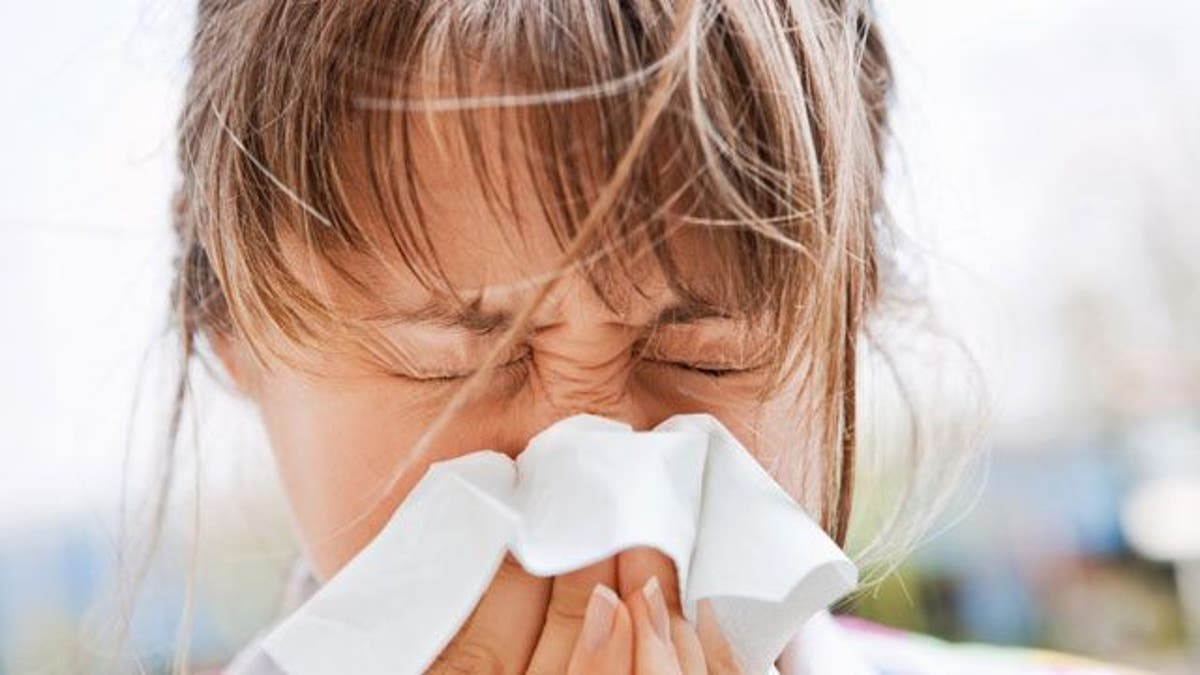
It’s always the worst time when that urge to sneeze hits—a quiet movie theater, an elevator packed with people, or right before you lean in you kiss your date goodnight.
There are just some times when you don’t want to spray snot all over the place. So is it safe to hold in a sneeze? We checked in with experts to find out what’s exactly behind your sneezing, and what can happen to your body if you try to snuffle one.
Why do we sneeze in the first place?
Sneezing is a complex physiological reflex. It occurs when you breathe in an irritating substance or particle, which passes through your nostrils into the lining of your nose.
This triggers a release of histamine, irritating the nerve cells in your nasal lining that travels from your trigeminal nerve—which provides sensation to your face—to your brain, explained Dale Amanda Tylor, M.D., M.P.H., otolaryngologist at ENT Associates of Santa Barbara. (Nasal congestion or allergies can spark the release of histamine, too.)
FDA WARNS ON 'POT CURES CANCER' CLAIMS
When your brain gets the signal, it activates your throat muscles, and tells your lungs to release a powerful burst of air through your windpipe, she says. This release of air occurs to push out the particles that are irritating your nose.
"Sneezes are so powerful that [your snot can] travel the dimensions of a room and land up to 6 to 8 meters away," said Erich Voigt, M.D., clinical associate professor in the department of otolaryngology at NYU Langone Health.
What happens if you hold in a sneeze?
All that pressure has to go somewhere.
“If you keep the mouth or nose closed, the generated pressure will back up into your head (sinuses), nasal cavity, or down the throat back into the chest," said Voigt. "Suppressing the sneeze by holding the nose or mouth leads to a noticeable increase in pressure, about 5 to 24 times of that during a normal sneeze.”
Still, snuffling a sneeze is so quick, so that rise in pressure is over fast. That means it can’t be harmful, right? Well, not exactly.
"It’s kind of like saying that when Floyd Mayweather punches you, his glove is in contact with your face for only a fraction of a second,” said Ahmad R. Sedaghat, M.D., Ph.D., assistant professor in the department of otolaryngology at Harvard Medical School. “But because the force/pressure during that fraction of second is so high, it can do real damage.”
What are the health effects of holding in a sneeze?
That trapped pressure can be the reason that holding in a sneeze can be dangerous, he said.
For one, your ears can be at risk. When you hold in a sneeze, air and pressure can travel up your Eustachian tubes—small passageways linking your throat to your middle ear—and cause your eardrum to rupture.
BOY'S CONCUSSION SYMPTOMS LEAD TO TUMOR DIAGNOSIS
"In the more severe case, instead of the air rupturing the ear drum, it leads to rupture of the delicate structures of the inner ear causing permanent hearing loss," Sedaghat said.
The pressure of holding in a sneeze can also cause you to pop a small blood vessel in your eye, nose, or eardrum, but that’s very rare, said Tylor.
It’s also extremely rare, but holding in a sneeze can cause the rupture of aneurysm, a condition where part of your artery wall weakens, causing a bulge.
“With an aneurysm, a weak part of [a blood vessel in the brain] could rupture at any time, or never rupture at all—but a sudden change in intracranial pressure could cause it to rupture,” said Tylor. “That would probably less common than getting struck by lightning.”
And before you freak out, the people most at risk of the serious injuries generally have health conditions that leave them more susceptible, like abnormal blood vessels, or have had recent sinus, vascular, or brain surgery, or a head, neck or chest injury of some kind, said Voigt.
Bottom line: Should you hold in your sneeze?
Let them rip: The function of the sneeze is to allow a release of pressure. If you hold it in, not only are you not allowing your body to do its job—clear out those nasal irritants—but you’re also putting your body at risk by containing that pressure.
Still, if there is a time when you really don’t want to sneeze, you can try to stimulate your other sensory nerves, which can help block your sneeze reflex, said Tylor. By blocking it at that step, you wouldn’t be trapping any pressure.
HOSPITAL, FAMILY TO DISCUSS TODDLER'S STALLED KIDNEY TRANSPLANT AMID PROTESTS
"You can sometimes prevent it by blowing the nose, or pressing on the region of the lip just below the nose, or rubbing the nose," she said.
And if you do sneeze, make sure you follow proper sneezing etiquette when it comes to spreading germs.
"Covering with a hand, which most of us were taught as kids, is now considered outdated advice," said Tylor. "The name of the game now is sneeze into your elbow (which you don't use to touch things like doorknobs or tablet screens or keyboards) or to sneeze into a tissue and then wash your hands right after."
It's not that this method diminishes your spray of saliva and mucus, but since you don't touch a lot with your elbow, you're essentially protecting others from viral or bacterial particles in your sneeze.
This article first appeared on Men's Health.








































